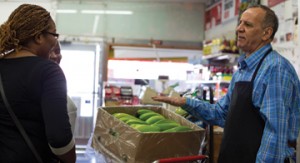Case in Point: Healthy Corner Stores Project
Case in Point: Healthy Corner Stores Project
 The International Rescue Committee (IRC) proposed a breakthrough plan to address the problem of limited access to fresh fruits and vegetables in local low-income neighborhoods. They proposed connecting local demand for fresh and culturally appropriate foods to local refugee farmers’ supply though neighborhood corner store development. The project continues supporting sustainable refugee integration into the community, increases demand for healthier foods, extends the supply of fresh produce into areas that don’t have it, and creates a new business model for local food distribution and sales – using existing retail outlets.
The International Rescue Committee (IRC) proposed a breakthrough plan to address the problem of limited access to fresh fruits and vegetables in local low-income neighborhoods. They proposed connecting local demand for fresh and culturally appropriate foods to local refugee farmers’ supply though neighborhood corner store development. The project continues supporting sustainable refugee integration into the community, increases demand for healthier foods, extends the supply of fresh produce into areas that don’t have it, and creates a new business model for local food distribution and sales – using existing retail outlets.
Since being awarded with a Health Innovation Grant, IRC has developed a multifaceted Healthy Food Financing Initiative. IRC representatives have nurtured corner store owners, financed and placed refrigeration units, assessed local residents desires for culturally appropriate fresh foods, and sourced production of those foods through its recently settled refugee farmers.
The goal is to connect 25 local farmers to at least 20 store owners, training both on how to collaborate successfully in providing fresh produce.
If you’ve never eaten cassava leaves, a popular African vegetable that used to be expensively imported in frozen bricks before this program, you haven’t lived in proximity to IRC’s corner stores. Store owners, residents and refugee farmers all win when affordable, fresh and Arizona-produced items like cassava are available and enjoyed. The economy wins too, and so does health. All thanks to an innovative and hyper-local supply and demand loop with multiple benefits.